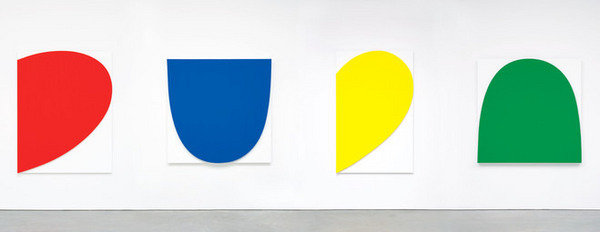Ellsworth Kelly
dal 15/5/2012 al 12/7/2012
Segnalato da
15/5/2012
Ellsworth Kelly
Marian Goodman Gallery, Paris
An installation of four 2-panel paintings, made this year, each consisting of a colored curve in relief against a white panel. Ellsworth Kelly has a long and rich relationship with the city of Paris. It is while living and working here that Kelly transitioned from figurative painting to his first efforts in total abstraction, and first experimented with chance, basing works on the river Seine and Parisian architecture.

This will be Kelly’s first show of paintings in Paris in 20 years, since his 1992 exhibition at the Galeries Nationales du Jeu de Paume which surveyed the early works he made while living in Paris from 1948-54.
The exhibition will include an installation of four 2-panel paintings, made this year, each consisting of a colored curve in relief against a white panel. Installed on the four walls of the gallery they read as a singular, iconic statement in a progressive spectrum of red, yellow, blue and green.
Kelly has often said he takes inspiration from observing the world around him, distilling to abstraction visual fragments like the shape of a leaf, an architectural vault, the bend of a page or the curve of a body. Throughout his long career Kelly has consistently revisited the curve in his most iconic paintings, drawings and sculptures. Predecessors for the curved reliefs on view here can be found dating back to early collages, reliefs and paintings made during the six years he spent living and working in Paris after World War II.
Curves appeared early in Kelly’s art. A wide arc tops the vertical shape in Kilometer Marker, 1949, and a pair of curves, not identical but complementary, reach down to the lower corners of Relief with Blue, 1950. As Kelly has explained many times, the forms of Relief with Blue originated in a sketch he made of a production of Hamlet at the Théâtre Marigny in Paris, which he saw during the late forties. The relief element, with its curved inner edges, alludes to the shape of a half open curtain.1
Ellsworth Kelly has a long and rich relationship with the city of Paris. It is while living and working here that Kelly transitioned from figurative painting to his first efforts in total abstraction, and first experimented with chance, basing works on the river Seine and Parisian architecture. It is also in Paris that he made his first Spectrum and Relief paintings that forever changed longstanding relationships between painting and the wall, painting and sculpture and between color and form.
The work that Kelly usually cites as his “first” work is in fact based on the windows at the Musée d’Art Moderne de la Ville de Paris:
Instead of making a picture that was an interpretation of a thing seen, or a picture of invented content, I found an object and «presented» it as itself alone. My first object was Window, Museum of Modern Art, Paris, done un 1949. After constructed Window with two canvases and a wood frame I realized that from then on painting as I had known it was finished for me. The new works were to be objects, unsigned, anonymous.2
At 88, Ellsworth Kelly is among the most distinguished of living artists, who has been the subject of countless museum exhibitions around the world. Most recently the Haus der Kunst, Munich organized a survey of Kelly’s black and white paintings which is currently on view at the Museum Wiesbaden, Germany. Also in 2012 The Graphische Sammlung of the Pinakothek der Moderne in Munich organized a survey of Ellsworth Kelly’s Plant Drawings which is traveling to the Metropolitan Museum of Art, New York in June. The Museum of Fine Arts, Boston recently organized a survey exhibition of Kelly’s sculptures in wood. The Solomon R. Guggenheim Museum in New York organized a retrospective of Kelly’s work in 1996, which traveled to The Tate, London and the Haus der Kunst, Munich.
1 Carter Ratcliff, Ellsworth Kelly’s Curves in Ellsworth Kelly: A Retrospective, Ed. by Diane Waldman, Guggenheim Museum, New York, 1996, p.57.
2 Ellsworth Kelly, source of his artist quotes on life, art life, theory and painting: «Notes from 1969», in Ellsworth Kelly : Works on Paper, ed. Diane Upright, Harry N.Inc., Publishers, New York, 1987, p. 9-10.
Opening May 16th
Image: Ellsworth Kelly, Curves on White (Four Panels), 2012 Oil on canvas—4 parts: red, blue, yellow, green Courtesy of the artist & Marian Goodman Gallery, Paris — Jerry L. Thompson
Marian Goodman Gallery
79 Rue du Temple - Paris
Tuesday – Saturday, 11 AM – 7 PM



